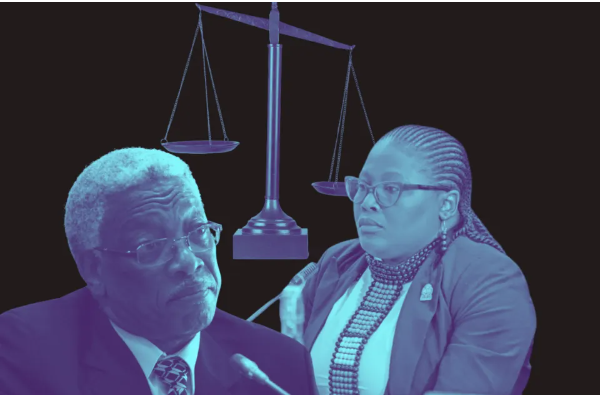
The ongoing sexual harassment inquiry into Judge Mbenenge has sparked intense public debate about power dynamics, consent, and ethical standards within the judiciary. The case, which has captivated both legal and public attention, raises critical questions about the integrity of judicial processes and the responsibility of public officials to uphold ethical conduct.
The inquiry, launched after multiple allegations of sexual harassment surfaced against the prominent judge, has led to calls for greater accountability and transparency within South Africa’s legal system. The complainants, all former employees and colleagues, have detailed incidents where they allege Judge Mbenenge used his position of power to coerce or manipulate them into sexual acts, some of which they claim were non-consensual.
Throughout the hearings, the focus has been on the delicate balance between professional authority and personal conduct. The allegations suggest a troubling abuse of power, wherein the judge, as a figure of authority within the legal system, allegedly leveraged his position to pressure vulnerable individuals into compromising situations. The testimonies have painted a picture of an environment where power and consent were blurred, creating a culture of fear and intimidation.
The case has ignited discussions about the broader implications for South Africa’s judicial system, particularly in how it handles allegations of misconduct by high-ranking officials. Many legal professionals argue that the judiciary must lead by example in maintaining ethical standards, especially given its role in ensuring justice and fairness in society.
The judiciary must be beyond reproach, said Professor Thuli Madonsela, a former Public Protector and legal scholar. When those who hold power within the justice system are accused of abuse, it undermines the very principles of fairness, equality, and integrity upon which our legal system is built.
In her testimony, one of the complainants described how Judge Mbenenge allegedly manipulated professional relationships and used threats of retaliation to gain compliance. He made it clear that my career was at stake. I felt like I had no choice but to comply with his demands, the witness said. The graphic details of these accounts have left many questioning whether the judicial system has done enough to protect its employees from sexual misconduct.
The inquiry also raises fundamental questions about consent within power-laden environments. Critics argue that in professional settings like the judiciary, where hierarchical structures are deeply entrenched, true consent can be difficult to ascertain. For many of the complainants, their silence or compliance was rooted not in mutual agreement, but in fear of professional repercussions, a reality that highlights the significant power imbalances in such cases.
In response to the allegations, Judge Mbenenge has denied all charges of sexual harassment, asserting that any encounters with the complainants were consensual and based on mutual respect. His legal team has argued that the claims are politically motivated, and that the judge’s reputation and career have been unjustly tarnished by unfounded accusations.
The case has brought attention to the broader issue of sexual harassment within South Africa’s professional and political arenas, particularly as it pertains to those in positions of power. Many women’s rights groups have rallied behind the complainants, calling for greater protection for victims of workplace harassment and stricter consequences for perpetrators.
This case is a reminder that sexual harassment is not just about inappropriate behavior; it is about power. The imbalance of power makes it nearly impossible for victims to freely and voluntarily consent. The law must be clear about this, said Zanele Mthembu, a spokesperson for the Women’s Legal Centre.
Ethical standards in the judiciary are a central theme of the inquiry, with many arguing that the principle of judicial independence should not shield individuals from scrutiny over their personal conduct. Legal ethics experts stress that judges, as public servants, should be held to the highest standards, and that any violations of ethical conduct could severely damage public trust in the legal system.
Public confidence in the judiciary is critical for the rule of law to be effective, said legal ethics expert Dr. Solomon Zulu. If the judiciary is seen as a place where abuse and misconduct are allowed to flourish, the entire foundation of justice is eroded.
As the inquiry continues, the stakes remain high for both Judge Mbenenge and the South African legal system. The outcome of the case will not only determine the fate of one individual but may also set a precedent for how sexual harassment and misconduct are handled within the country’s institutions. With the legal and ethical questions at the forefront of the inquiry, it is clear that this case will have lasting implications for South Africa’s judiciary and its commitment to upholding justice and accountability.
The inquiry, which is expected to conclude in the coming months, will undoubtedly shape the future of sexual harassment law and professional conduct in South Africa. It also serves as a critical reminder of the importance of vigilance and integrity in positions of power.

